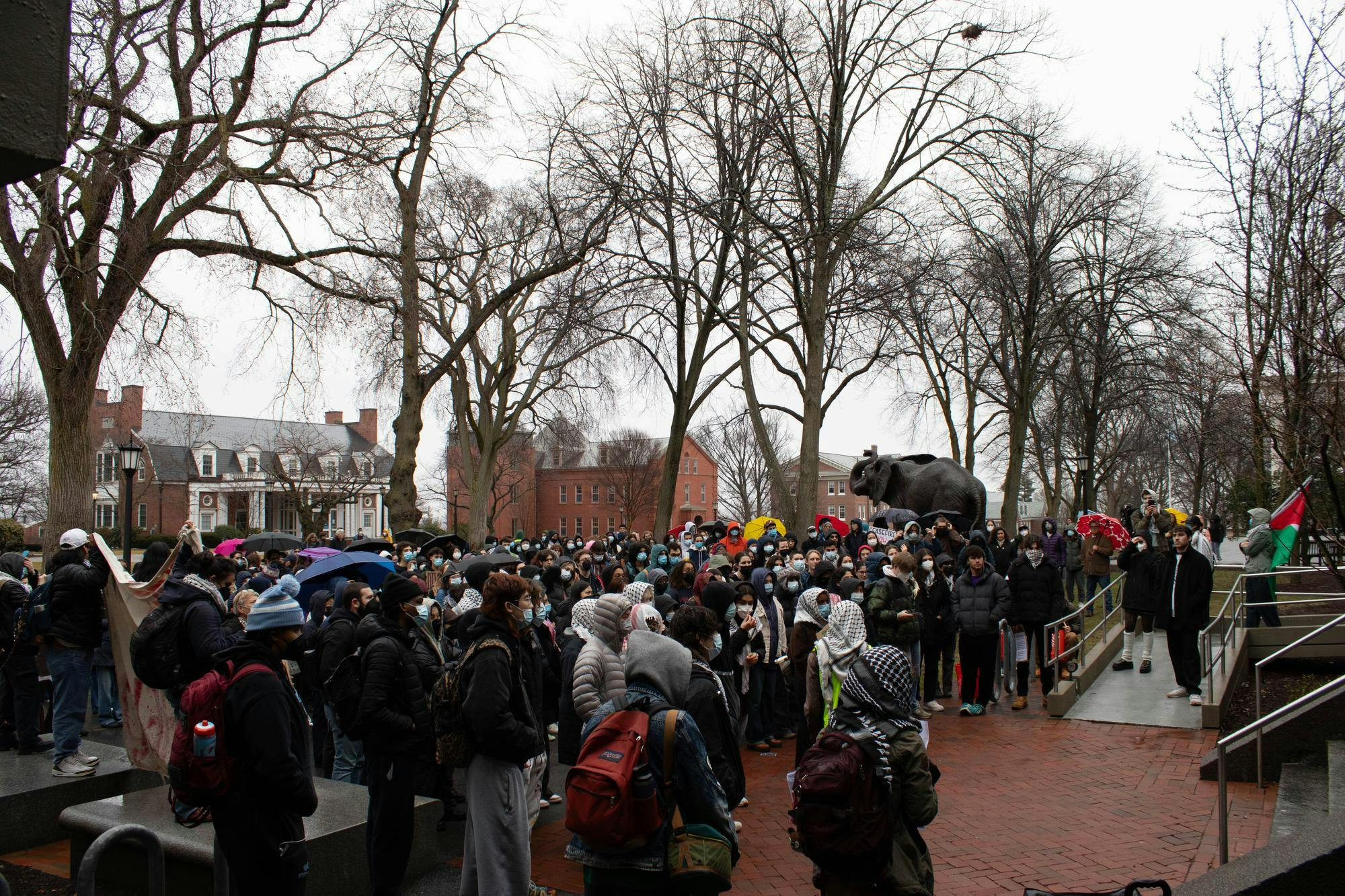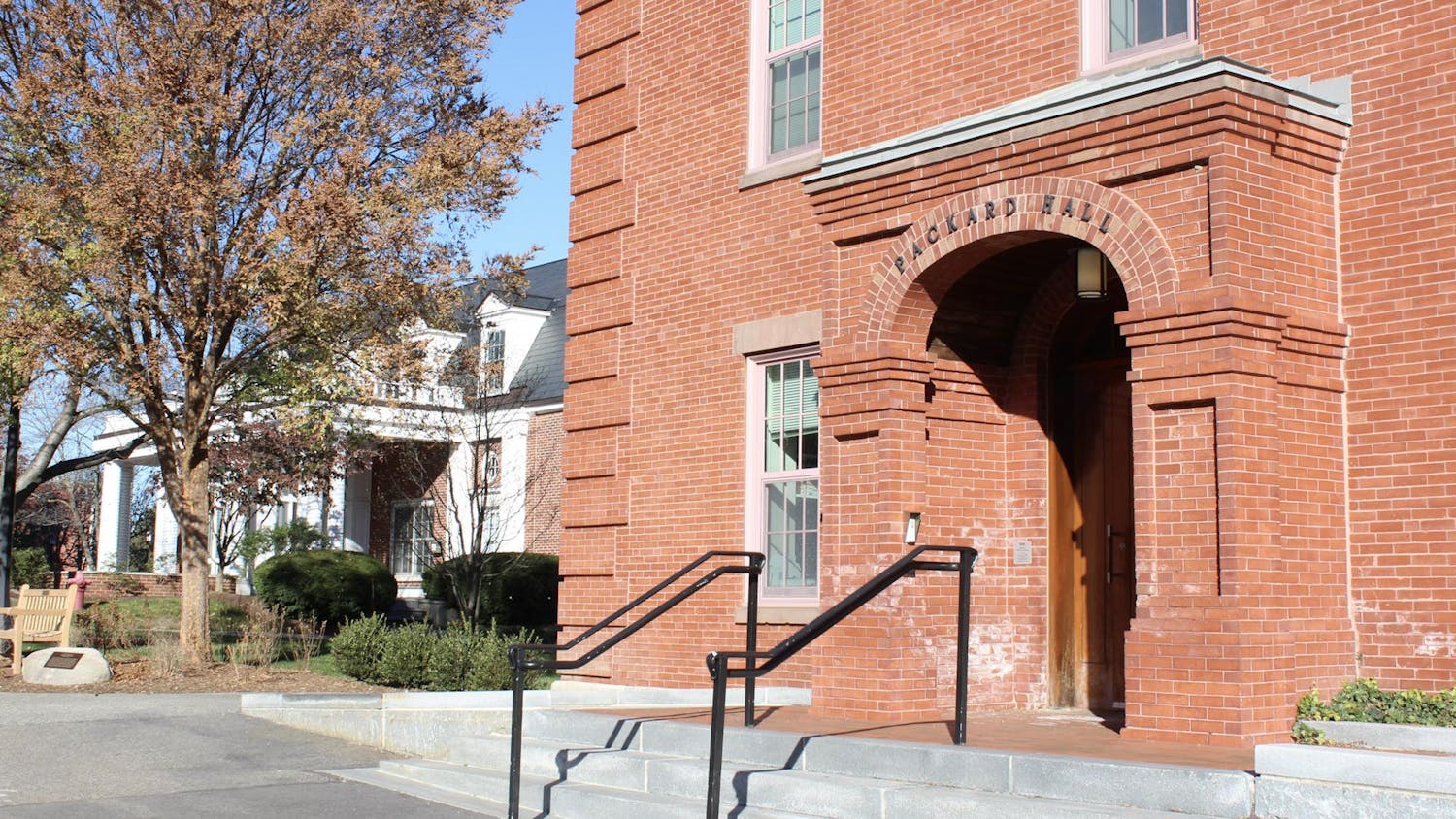In an email sent to the wider Tufts community on Monday, University President Sunil Kumar condemned the three recently passed Tufts Community Union Senate resolutions that called on the university to cut ties to Israel and to acknowledge the Palestinian genocide in Gaza. Sent less than 12 hours after the Senate announced results around 3 a.m., Kumar’s email sparked a student protest and die-in at Barnum Hall on Tuesday.
Kumar, and other senior leadership who signed the email, stated that despite the several hours-long deliberations which show “how our campus reflects the deep division in society on these issues,” they are “disappointed” that a majority of TCU senators voted to approve the resolutions. They reaffirmed the university’s stance against the global movement to end support for Israel, stating that the university supports all of its study abroad programs and will not halt current business relationships.
“The immense loss of life in Gaza is tragic. We mourn with the Palestinians, but we also feel for the Israelis grieving over those they have lost and share their desire for the safe return of the hostages. It is also possible for us to be supportive of both the right of Israel to exist and for the self-determination rights of the Palestinian people,” administrators wrote. “However, these resolutions do not allow for these views to coexist and, as a result, force our community into opposing groups rather than uniting us to build from areas of agreement.”
Kumar wrote that the university will investigate reports of antisemitic and Islamophobic conduct from Sunday’s Senate meetings, where students both for and against the resolutions allege they experienced instances of spitting, cursing and fighting. He also endorsed several university-sponsored initiatives to create “nuanced conversations.”
In response to Kumar’s email, the Coalition for Palestinian Liberation organized a protest of over 150 students outside of Barnum Hall on Tuesday.
“Students came out to show that despite months of repression and silencing we will never be silent,” the coalition wrote in a message to the Daily, saying that Tufts’ “denial of the democratic process was a direct attempt at silencing Arab students and students of color.”
The coalition’s choice of Barnum Hall — home to the Jonathan M. Tisch College of Civic Life — for its die-in was intentional. CPLT wrote that the college’s “alleged vision of anti-racism and civic engagement [is] clearly meaningless as long as they remain silent during suppression of student voices.”
Student speakers repeatedly denounced Kumar’s messaging, at one point taking specific issue with the university’s supposed failure to uphold one of its core values of respecting a “collaborative environment.”
“Instead of being met with understanding and acknowledgement from the university, we were belittled, dehumanized and discredited. Our experiences were put into question and our narratives as Palestinians were undermined,” a student said. “We collaborated alongside 38 clubs, to be specific, on streamlining this principle of democracy and autonomy. We have finally decided to be involved in the bureaucratic political decision-making process, as is our right as students who attend this university. … The facade of democracy built by Tufts completely collapsed with the university’s response email. The jarring dissonance that belies it displays a juxtaposition of what the administration claims to value versus the truth.”
Students also condemned Kumar’s support for structured university programs like “Dialogue & Action in a Time of Conflict.”
“We are entirely angered by both the events of the Senate meeting and the university’s abhorrent response,” the first speaker said. “We have always refused to come to the table with our colonizers and those who oppress us, creating a false equivalency between the colonizer and the colonized. Instead, we have organized the communities around us into fighting and advocating for our liberation.”
On the crowd’s periphery, students reported that a Tufts faculty member, part-time mechanical engineering lecturer Harold Miller-Jacobs, asked a female protester, “Did you get raped?”
In a phone call with the Daily, Miller-Jacobs confirmed these allegations, and said that he expected the answer “to be no,” telling the protester, “many of the victims of Hamas cannot say that.” Miller-Jacobs claimed that protesters supported the terrorist organization Hamas, and that “advocating for them is horrendous.” During the protest, a speaker criticized “rhetoric equating Palestinians and the resolution writers to Hamas,” levied during Sunday’s Senate meeting.
The crowd then marched from Barnum down to Gifford House — Kumar’s residence — and plastered flyers reading “Shame on Sunil Kumar” and “Shame on Tufts” on the door. Taking up positions on the front lawn, three South Asian students addressed the crowd.
“At the beginning of the semester, you expressed regret for having disregarded other perspectives and claimed to commit yourself to doing better,” one of these students said. “As a figurehead, your role requires you to take accountability for your actions and acknowledge the voices of your students, not erase them. What is the purpose of your position if you are going to completely disregard what your students are asking of you?”
Traversing Packard Avenue and Talbot Avenue, then the covered stairwell of Mayer Campus Center, students walked up the stairs next to Tisch Library and eventually returned to Barnum Hall. The crowd then filled the building shortly after 3 p.m., staging a die-in by silently lying on the hallway floors. Students painted their hands with red paint and held flyers with the names and faces of several Tufts trustees, complete with the words “Complicit in Genocide” and “Divest Now.”
Inside Barnum, another student speaker criticized Tufts’ connection to the Anti-Defamation League, which has previously funded Tufts University Police Department training trips to Israel.
“The ADL [claims] that they are an organization fighting injustice and antisemitism, but in reality, the ADL has only further entrenched the oppression of all marginalized groups including Jews like me,” the student said.
After around 40 minutes, students exited the building and dispersed after reading aloud a pledge for boycott, divestment and sanctions against Israel.






